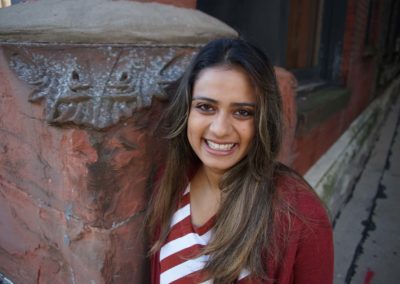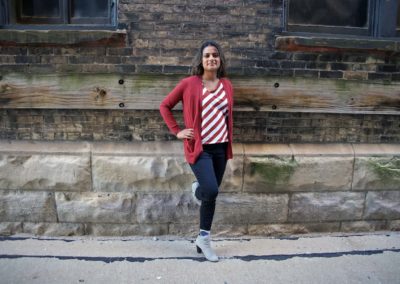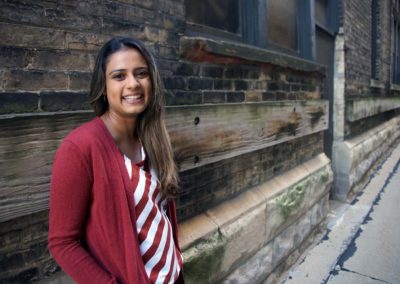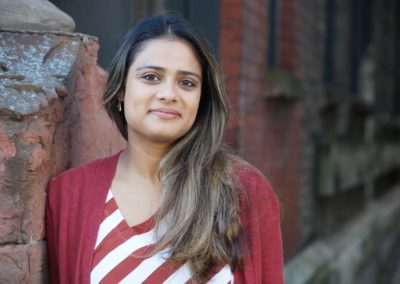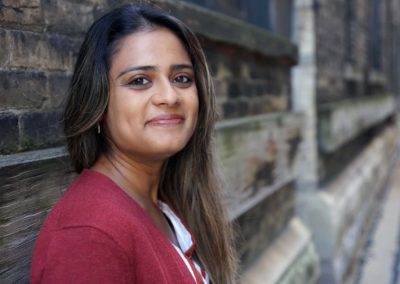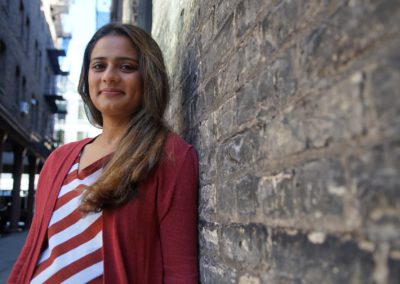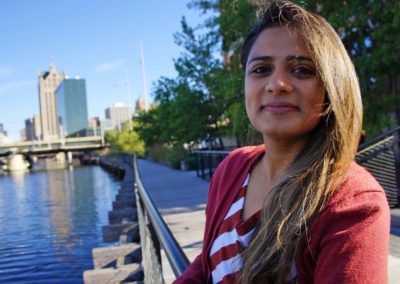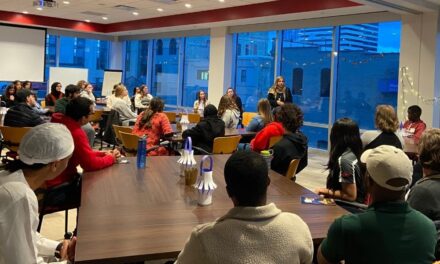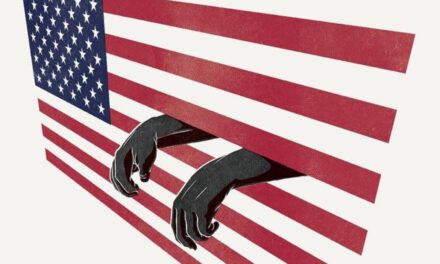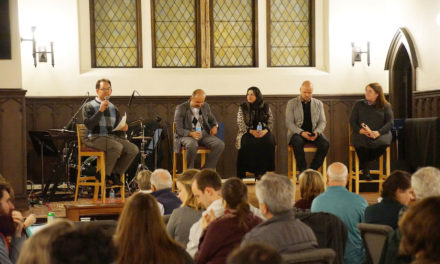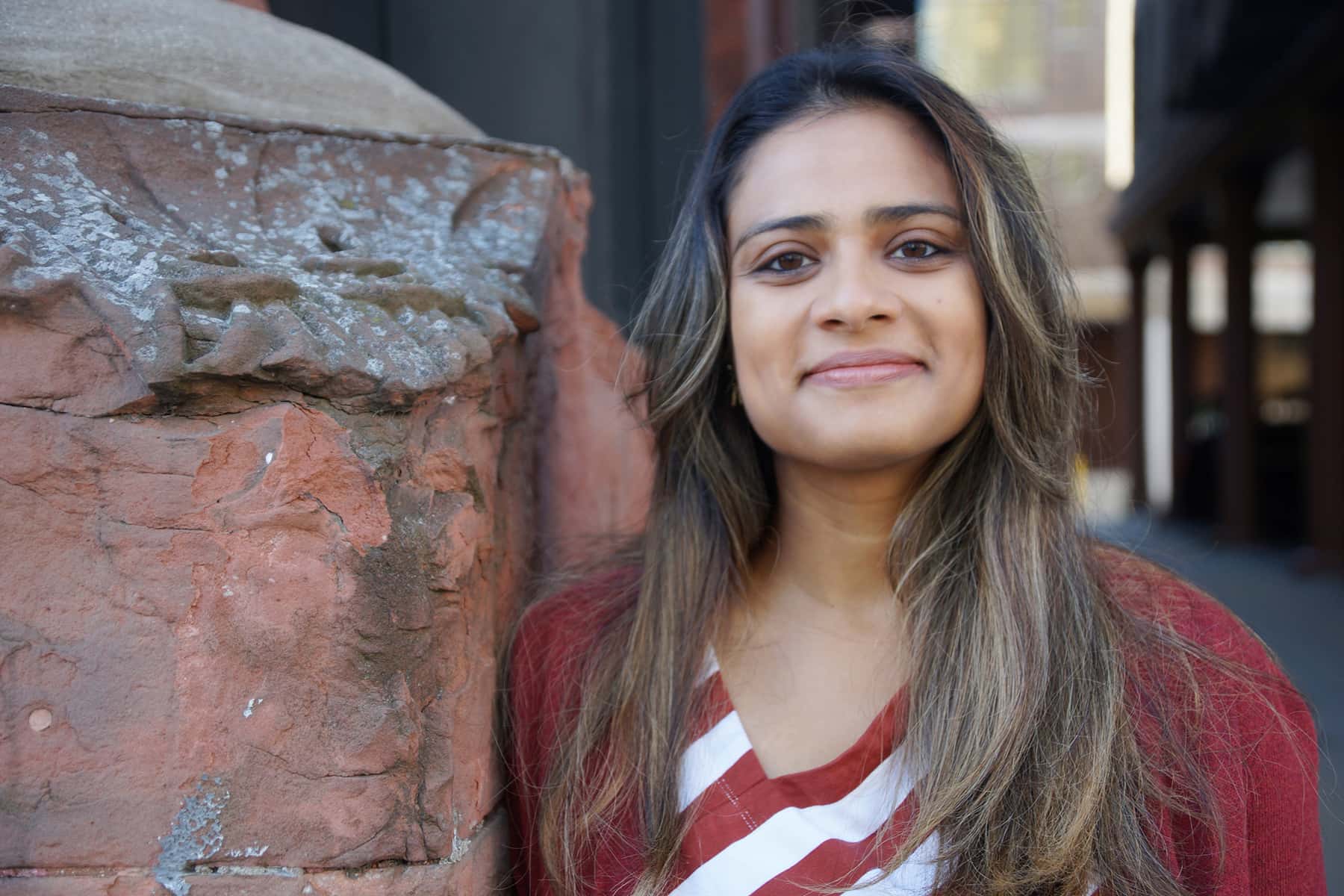
This interview is part of an ongoing editorial series. Each segment highlights a woman in the Wisconsin community. The stories are intended to share personal struggles, public achievements, and the social complexities with their Muslim identity.
As an attorney for ACLU of Wisconsin, with a law degree noted for academic excellence, Asma Kadri Keeler’s cultural identity and curious nature have been driving forces of her support for issues of equality, especially for women. Encountering more racial disparity in Wisconsin than reactions to her Muslim identity, Kadri Keeler can relate to her civil liberties work from personal experiences. The Wisconsin Muslim Journal spoke with her about insecurities, accomplishments, and her passion to advocates for others.
Q&A with Asma Kadri
Wisconsin Muslim Journal: Did you experience a culture shock within your immigrant family while growing up, or feel the need to code switch, being a first generation child born in America?
Asma Kadri Keeler: As a first generation American, code switching is my norm. People like me grow up feeling strange because we don’t know how to seamlessly transition our home life experience into our public life experience at school and at work, especially when we are younger. We adapt defensively to try to make ourselves more “normal.” I don’t think I experienced culture shock as much as I just couldn’t understand sometimes why I felt anxious about my family engaging in social settings. I always had a justification or excuse ready for why I wore what I wore, or ate what I ate, or why my parents did things differently in any way. When eating rice and curry for lunch instead of a sandwich and chips, I always felt like I had to say something about it even if no one asked. I remember being a part of a secret Santa exchange in the seventh grade with a group of friends and having the person to whom I gave my gift to say “Asma is my secret Santa, the paper smells like her house.” First generation kids get exposed far more often to situations that require emotional defense. In response, we develop a thick skin about our identities and code switching is a natural reaction.
Wisconsin Muslim Journal: What is your fondest childhood memory? And what from your youth has continued to have the biggest impact on your life?
Asma Kadri Keeler: My family is the aspect of my youth that continues to have the biggest impact on my life. I have had the fortune of growing up around extended family and when I was younger, we spent a lot of time together. Whether it was socially at amusement parks and parks or academically when four of my family members attended the same college as me, I’ve been motivated by my family. I have family members that are impressively accomplished in their fields and yet incredibly humble in their achievement. I have family members that push me and support me and are proud of my work. I do my work and live my personal life knowing that I want to share all of it with them.
My fondest childhood memory is not one alone but it is every time I’ve traveled with my immediate family. Me, my brother, and my sister always had the best time on long plane rides talking about the places we were headed and what they would be like. As we got older, our conversations got more challenging and deep often including the challenges facing the areas we were headed. That time we spent together uninterrupted, just talking, and being curious shaped me as a person and I hope to carry that on to my own family someday.
Wisconsin Muslim Journal: Being a woman and being a Muslim each has social challenges in America, in addition to racial issues regarding your ethnicity, so what has your experience been like in Milwaukee compared to peers who share one or none of those attributes?
Asma Kadri Keeler: I think my experience in Milwaukee has been a bit better than my experience growing up in Kenosha. Milwaukee is more diverse overall and has more Muslim people so I feel more connected here. That being said, the Milwaukee legal community is very heavily dominated by white people and men. In that way, I’ve found it hard to comfortably transition into being a lawyer in Milwaukee because I know I stick out. Being noticeably different really can negatively impact self-confidence, but I am fortunate to work with lawyers who are conscious of how I am different and try to use my differences as a strength. My husband is a white, male, Muslim attorney and has had a different experience transitioning in Milwaukee. Most people seem to care less about his Muslim identity because he is white and male. There is less judgment. It seems like in Milwaukee, as opposed to Washington D.C., where we were living before, being white is more important than your religious identity so I feel like my racial disparity is more of an issue than my Muslim identity. When I attend a legal matter or social event for my profession in Milwaukee or other places in Wisconsin, I am more often than not the only colored person in the room. That makes me feel more insecure than being Muslim because it is readily visible.
Wisconsin Muslim Journal: What or who inspired you to pursue a career in law? And what was your most memorable experience in law school?
Asma Kadri Keeler: I can’t say it was any one thing that inspired me to pursue a career in law. I think it was a combination of things. First, I attribute my great privilege of being able to travel the world as a motivating factor. I’ve been exposed to so many different cultures and people that I find it impossible to ignore the realities of other people that have it so much worse than we do. Second, I am by nature a curious person. That I can thank my parents for. I grew up in a house where learning was venerated and asking questions was encouraged. Being a lawyer requires non-stop acquisition of knowledge on any number of topics and it seemed like a natural outlet for my curiosity. Finally, I think there were always a number of people that I found attractive growing up and they all had one thing in common: they were passionate advocates for others. Whether it was politicians, judges, teachers, or doctors, I loved the idea of standing up and representing something I believed in.
Wisconsin Muslim Journal: Why do the issues of women’s rights and religious freedom connect with you personally?
Asma Kadri Keeler: I’m a first generation woman of color and I was raised Muslim. My religion and my upbringing, though steered by my father, focused on female independence. My dad insisted at every turn that my sister and I be educated to the highest levels, maintain financial independence, and never allow anyone to make choices for us, including him. When our now-spouses approached our father for our respective hands in marriage, my dad asked my sister and I first before agreeing because according to him, he had no place to answer yes to a lifelong commitment we would make. Those principals are rooted in his belief in Islam and its base principal that women and men are moral equals. The Prophet Muhammed regularly consulted women and history of Islam shows that women had unfettered access to education during the time of the Prophet. There are dozens of other historical records within Islam reflecting a respect of equality between the sexes and those who practice Islam typically recognize that in their own lives as well.
However, it’s a fairly mainstream opinion in the United States that the Islamic religion and the Muslim world oppress women. We frequently hear on the news that Muslim majority countries prevent women from learning or driving or are forcibly beaten by their spouses. It’s clear to me those are cultural choices, not religious and I compare those conversations against what the reality of being a woman in the United States actually is. We live in the self-proclaimed freest country in the world with a wide acceptance of all cultures and religions, and yet the income inequality gap between men and women is one of the worst, one in four women under 30 report being sexually harassed or raped (including by male spouses), multiple states have laws that allow girls under the age of 18 to be married at the direction of her parents, and young girls are regularly shamed for being a distraction to boys when they wear certain clothing at school or in public. It seems almost nonsensical to me that in a country where religious freedom is a founding principle, we crucify Islam for cultural behavior adopted by others, including ourselves. Our mainstream conversations focus on the unfairness and archaic nature of the burka while we simultaneously send girls home from school for wearing a tank top that exposes too much of their collarbone. These two issues intersect for me because I have experienced more empowerment as a woman at home in my Islamic surrounding than I have in the public in America.
I believe in women’s equality across the board, not just because my religion is a champion for it. Moreover, I believe that America’s root principles are at odds with how American society treats women today. I would like to see our society reflect the female equality and independence I experienced growing up in a progressive Muslim home.
Wisconsin Muslim Journal: What are your hopes for the future of the Muslim Community in Wisconsin? And what are some of the biggest challenges you think the population has faced and will continue to deal with?
Asma Kadri Keeler: My hopes for the Muslim Community in Wisconsin is that we continue to educate. In the places I’ve lived, I haven’t seen a Muslim community quite as engaged in public education as the one I’ve seen here. One of the things that inspires me most is how patient the Muslim community is here in our quest to educate and bring people across divides.
I think some of the biggest challenges we face is overcoming stereotypes. It takes a lot of effort and energy to reverse fear. Something our community has been bombarded with since 2001 more heavily than in years past is fear of our people, fear of our religion, and fear of our way of life. In order to overcome fear, we have to put aside our anger and disbelief and focus on educating which seems like an unfair burden. We have to explain away the behavior of individuals who use our faith to justify bad behavior at rates much higher than other religions. I don’t see this going away anytime soon, especially in our current climate where individuals in our highest seats of government are sowing that fear.
Wisconsin Muslim Journal: America does not have the same human rights problems as in international conflict zones, but what issues particular to Wisconsin would you say qualify to be classified as such and why?
Asma Kadri Keeler: While we do not live in an active international conflict zone, Wisconsin faces problems that easily can be classified as human rights violations. The Universal Declaration of Human Rights (UDHR) adopted in 1948 expressly provides rights and freedoms guaranteed to each person without distinction of any kind, including race, language, religion, or other status. It also prohibits torture, grants equal protection to all, and provides for basic rights and freedoms such as freedom of movement, the presumption of innocence, and the right to marry. Despite that, the state of Wisconsin creates laws and passes regulations that implicate the UDHR and dozens of other international covenants and treaties on the protection of human rights. In some ways, to me, this is worse than the human rights violations we might see arising from conflict zones. Often, those are the product of war and instability. Here, we have legislators and governors that deliberately, and sometimes negligently, set into law programs that strip people of their basic human rights. And even worse still, once the problem is widespread, our government will do little to fix it.
Wisconsin incarcerates more individuals than any other state in the U.S. In doing so, it creates some of the worst prison conditions in violation of many international human rights laws. For example, solitary confinement has regularly been held as a violation of international human rights laws and anti-torture treaties and yet a Wisconsin prisons keep prisoners in solitary confinement for up to 23 hours a day. In some institutions, inmates are denied access to religious materials or medication which is a blatant violation of international human rights laws as well as fairly well established U.S. constitutional law.
The city of Milwaukee has over a 100 lead poisoning cases for children under the age of six from drinking water and contaminated pipes. Access to clean water has regularly been recognized by the United Nations as a human right. While it is clear every country in the world that children are unique in their need for care and protection, except the United States and Somalia which are the only two countries to deny the International Convention on the Rights of the Child, the state of Wisconsin does not take active steps to protect the rights of children under the age of 18. Whether it be the issue of lead poisoning, providing equal access to quality public education, encouraging and protecting the special needs of disabled children, or allowing children the freedom of association. School districts in Wisconsin have regularly cracked down on school aged students for protesting or have imposed arbitrary restrictions on children at the expense of their comfort. Further still, the State of Wisconsin used punitive solitary confinement and pepper spray on juvenile offenders some as young as 11. These are blatant violations of human rights laws, even if the United States chooses not to recognize them.
One other big human rights issue Wisconsin is in the spotlight for is Act 10 and Governor Walker’s crack down on unions. While many do not see union work as a human right, the UDHR Article 23(4) provides that everyone has the right to form and join trade unions for the protection of his interests, not to mention Article 20 that protects the right to association. Wisconsin has such a rich history of protecting unions and it is the underpinning of our very identity as a state. The limitation of union access since 2011 is a significant human right violation in Wisconsin and needs to be restored because it disproportionally shifts the balance of power and strips employees of their ability to be heard.
Wisconsin Muslim Journal: What is the most challenging part of your work? And if you had not taken this path in life, what other direction could you have gone?
Asma Kadri Keeler: The most challenging part of my work is not getting disenchanted. When the work you do every day exposes you to the darkest functions in our society, it is really easy to get sucked into the negative. It is even more challenging when we have a difficult case and a worthwhile issue that we can’t win because of public opinion or bad law. It is extremely difficult to tell an individual who has been horribly mistreated that justice isn’t in the cards for them. For me, I try really hard to focus on the victories we are able to achieve and the proactive work we are doing to make people’s lives better and our society stronger piece by piece.
If I hadn’t taken this path, I think I would have pursued a career in public relations. I really enjoyed getting my degree in communications in undergrad and I love working on crafting a good story. In some ways, that formed the base of my choice to go to law school. Being a trial lawyer is really about crafting a good story and persuading a judge or jury that your client’s experience is worthwhile. Public relations is the same sort of concept but for the public and media at large. My interests have always been to give a voice to those without a platform and I think I would have enjoyed doing that as a publicist, as well.
Wisconsin Muslim Journal: What would you say to a young girl interested in studying the law, but disadvantaged either by financial, environmental, or social limitations to pursue her dream?
Asma Kadri Keeler: Don’t give up. I took a lot of hits financially and socially when pushing forward in my legal education. I transferred schools, took out loans, moved across the country, and left my family to follow my dreams. Doing this work requires sacrifice and commitment but it is always worth the pay off. Studying the law is a deeply rewarding way to expand your education and it helps you look at the world in an entirely new light. The best part of studying the law is that you are never done learning. It is a natural outlet for curiosity while being a hugely respected profession. I would say to any young girl wanting to study the law, we need you. Women lawyers are a rarity and the time has long come to add more women to this field. I believe in the power of women to overcome just about any challenge, after all, we are born into a society that is inherently stacked against us and we rise above in every field. Studying the law is no exception, keep pushing forward.

